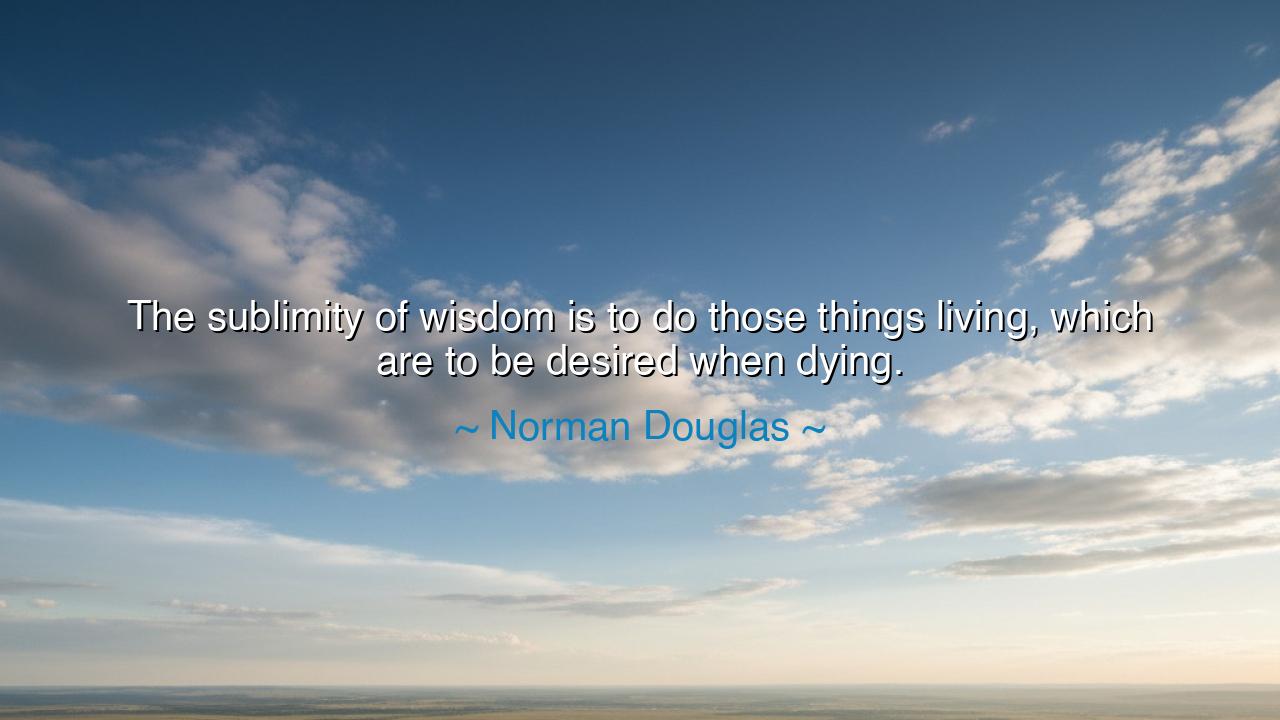
The sublimity of wisdom is to do those things living, which are
The sublimity of wisdom is to do those things living, which are to be desired when dying.






Hear me, O children of the future, for I speak of the highest sublimity of the human soul, a truth that was spoken by the wise Norman Douglas: "The sublimity of wisdom is to do those things living, which are to be desired when dying." These words carry the weight of a lifetime, for they call us to reflect not on what we do in the heat of youth, but on the legacy we leave behind. To live in such a way that, when the final moments approach, we can look back with peace and pride—this is the true measure of wisdom. For it is not in the wealth we accumulate, nor the power we gain, but in the deeds done with love, honor, and integrity, that we find the deepest fulfillment.
Consider the ancient philosophers, who lived not for fleeting pleasures, but for lasting virtues. Socrates, who in his final hours chose to face death with courage rather than seek escape, understood this profound truth. He asked his disciples to live virtuous lives, for in doing so, they would find the peace of mind that comes when facing the end of one’s days. To live a life that seeks truth and justice, to help others and build a better world—these were the things he desired in his final moments, and he lived them every day.
In more recent times, think of Mahatma Gandhi, who spent his life fighting for justice and peace. When death came for him, it found him not in regret or fear, but in the quiet pursuit of the values he had spent his life cultivating. Gandhi's life was a reflection of Douglas' wisdom: he lived in a way that, when he reached his final breath, he could die content, knowing that his deeds were aligned with the highest virtues of truth, love, and selflessness. Gandhi did not live for wealth or power; he lived for the good of others, for the freedom of his people, and for the peace of the world.
So, too, did Mother Teresa live her life. Her work with the poor and the sick in Calcutta was not motivated by fame or recognition, but by a profound desire to do good in the world. When her life came to an end, she had no regrets, for she had lived every day in service to others, with compassion and love. Mother Teresa's example teaches us that the highest measure of wisdom is not in acquiring material wealth or accolades, but in choosing to live a life that reflects the values one would want to hold close when standing at the gates of death.
O children, let this be your guide: live in such a way that your heart is unburdened by regret when the end comes. Let your days be filled with deeds of love, compassion, and honor, so that when you look back on your life, you see a path of goodness that aligns with the wisdom you wish to embody in your final moments. The sublimity of wisdom is to live now in a way that honors all that is noble, knowing that when death comes, it will find you ready, content, and at peace with the life you have led.






PMThang Phan Minh
Reading this, I feel reflective about personal priorities. How often do we act in ways that future selves would appreciate or regret? I also question whether wisdom lies solely in individual discernment, or if guidance from others—mentors, literature, or philosophy—is necessary to recognize what is truly desirable. It makes me consider the tension between immediate pleasures and lasting fulfillment, and whether a truly wise life requires constant evaluation of choices in light of mortality.
VPLe van phuong
I am intrigued by the interplay between life and death in this idea. Does it suggest that our daily decisions should be evaluated as if we are already facing the end, ensuring they align with ultimate significance? I also wonder about cultural or philosophical differences—do different traditions define these 'desirable' things differently? The quote challenges me to consider whether living consciously in accordance with long-term values is practical or aspirational in modern life.
DTDong Trung
This statement inspires philosophical reflection. I wonder if Douglas implies that true wisdom requires foresight, moral clarity, and intentional living. Can wisdom be cultivated without reflection on mortality, or does awareness of death uniquely sharpen our understanding of what should be desired? It also makes me question whether the pursuit of such sublimity is attainable for most people or remains an ideal that guides behavior rather than a fully realized state.
LHPham Lien Huong
I feel a sense of urgency in this quote. It prompts me to ask whether people often prioritize trivial or fleeting concerns over what will genuinely matter in retrospect. How can one cultivate the judgment to focus on enduring values while navigating everyday pressures and distractions? It also makes me think about legacy: are our actions more about personal fulfillment, moral duty, or the impact we leave for others?
VPVo Phan
Reading this, I’m struck by the idea that wisdom is measured by actions aligned with ultimate values rather than immediate gratification. It makes me wonder how one discerns what will truly matter at the end of life. Are these desires universal, or do they vary so much between individuals that each person must define their own criteria for a meaningful life? This challenges me to reflect on whether my current choices reflect long-term significance.